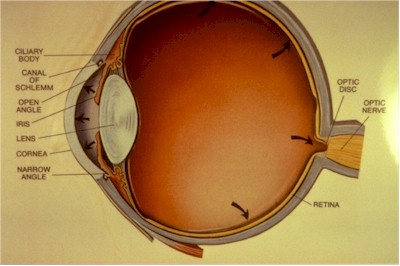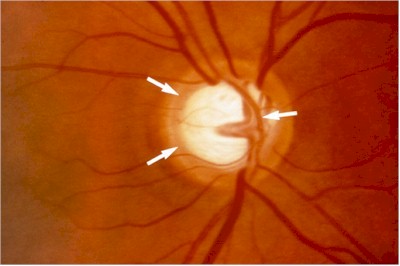 Glaucoma was recognized as early as 400 BC.
In the 1800's, glaucoma was recognized as a distinct disorder, although it frequently
coexisted with cataracts.
Glaucoma was recognized as early as 400 BC.
In the 1800's, glaucoma was recognized as a distinct disorder, although it frequently
coexisted with cataracts.Written by Rohit Krishna, MD
 Glaucoma was recognized as early as 400 BC.
In the 1800's, glaucoma was recognized as a distinct disorder, although it frequently
coexisted with cataracts.
Glaucoma was recognized as early as 400 BC.
In the 1800's, glaucoma was recognized as a distinct disorder, although it frequently
coexisted with cataracts.
Glaucoma accounts for blindness in more than 5 million persons. It is the leading cause of blindness in African Americans and the second leading cause overall in the United States. Glaucoma typically occurs after 40 years of age, although there are several types of glaucoma that present at an earlier age.
Risk factors or associations for development and progression of glaucoma include advancing age, family history, African American race, nearsightedness, hypertension, diabetes, high cholesterol, smoking, and thyroid disease.
 In glaucoma,
the optic nerve - the nerve that gives you your vision, which comes off the brain -
becomes compressed. This is how you lose your vision.
In glaucoma,
the optic nerve - the nerve that gives you your vision, which comes off the brain -
becomes compressed. This is how you lose your vision.
Glaucoma is a multifactorial disease. Current theories include increased pressure within the eye, decreased blood flow to the eye, and genetics.
Glaucoma usually presents without any symptoms and thus is called the "sneak thief of sight." At first you may lose your side vision, which may be unnoticeable to you. Late in the disease, after much of the optic nerve has been destroyed, you may lose your central vision, which then becomes noticeable. There are a few types of glaucoma that may have symptoms; such as glaucoma in newborns that may present with eyes that appear large and have a white hue to the front surface of the eye or sudden attack glaucoma where the eye becomes very painful and red. These, however, are a minority of cases in the United States. The majority of glaucoma is asymptomatic.
In addition to a careful optic nerve examination and eye pressure measurement, there is a test called a visual field which can be done to determine how much of your vision has been lost. This is why it is so important to catch the disease early.
Many people are devastated when they are told that they have glaucoma. It does not necessarily mean you will go blind. It is extremely important to note that once glaucoma is diagnosed, there are a number of interventions that may be sought to prevent further vision loss or slow down the vision loss to a rate that will not affect your daily life. One of the most important factors in determining your ultimate outcome is how early the diagnosis is made. Vision that has already been lost from glaucoma may not be restored currently. However, further vision loss may be preventable.
In order to understand how glaucoma works, you need to think like a plumber.
If you visualize your kitchen sink, there is a faucet and a drain. In the eye, the faucet
is always on (by the way, this is not the tearing system, this is a separate plumbing
system inside the eye). Moreover, in our analogy, the drain is always open.
POAG (primary open-angle glaucoma)
Pigment dispersion glaucoma
Pseudoexfoliation glaucoma
Narrow angle / closed angle glaucoma
Angle closure (sudden attack glaucoma)